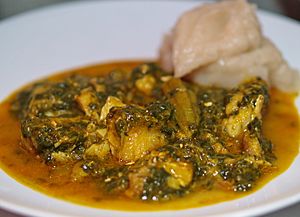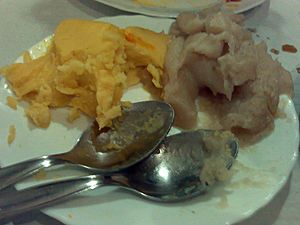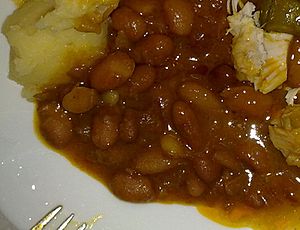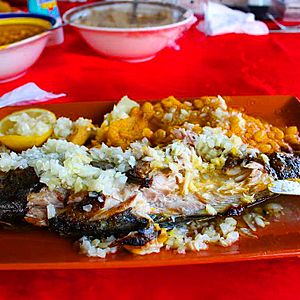Angolan cuisine facts for kids
Angolan cuisine is full of delicious dishes that people love, both in Angola and around the world! Some of the most famous foods include funge, which is made from cassava or corn flour, and mufete, a tasty meal with grilled fish, plantains, sweet potato, and cassava. You can also find calulu, moamba de galinha, and many other yummy meals. Don't forget to try mukua sorbet, a popular frozen treat!
Contents
Main Ingredients in Angolan Food
Angolan food uses many common ingredients. You'll often find beans and rice, pork, and chicken. Vegetables like tomatoes and onions are popular. Spices such as garlic add lots of flavor.
A very important food is Funge. It's a type of porridge made from cassava flour. You'll find it in many meals.
Angolan cooking also has influences from Portuguese cuisine. For example, olive oil is often used. Piripiri is a popular local hot sauce that adds a spicy kick!
Popular Angolan Dishes
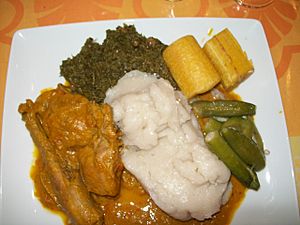
Funge (also called funje) and pirão are very common dishes. In some homes, people eat them at almost every meal! These dishes are often served with fish, pork, chicken, or beans.
Funge de bombo is more common in northern Angola. It's a paste or porridge made from cassava flour. It feels a bit like jelly and is gray. Pirão is yellow and looks a bit like polenta. It's made from cornflour and is more common in the south. The flour used to make both funge and pirão is called fuba. These foods are simple but very filling. People often eat them with sauces or a spicy condiment called gindungo.
Moamba de galinha is a chicken dish made with palm paste, okra, garlic, and palm oil sauce. It's often served with rice and funge. Both funge and moamba de galinha are sometimes called the national dish of Angola. A different version, moamba de ginguba, uses peanut sauce instead of palm paste.
More Delicious Dishes
Here are some other common dishes you might find in Angolan cuisine:
- Arroz (rice) dishes: These include arroz da Ilha (rice with chicken or fish) and arroz de marisco (white rice with seafood like prawns or lobster).
- Cabidela (chicken in blood sauce): This dish is cooked with blood and served with rice and funge. It often uses chicken with vinegar, tomatoes, onions, and garlic.
- Caldeirada de cabrito (goat stew): This goat meat stew is served with rice. It's a traditional dish for Angola's Independence Day on November 11.
- Fish stews: These include caldeirada de peixe, made with "whatever fish is available" and served with rice. Another is muzongue, made from dried and fresh fish cooked with palm oil, sweet potato, and vegetables.
- Calulu: This dish uses dried fish with vegetables like onions, tomatoes, okra, and sweet potatoes. It's often served with rice, funge, and palm oil beans.
- Feijão de óleo de palma: This means beans with palm oil. It's made with beans, onion, and garlic cooked in palm oil. It's often served with fish, banana, and farofa.
- Frango (grelhado) piri-piri (piri-piri chicken): This grilled chicken is famous in Angola and Mozambique. It's cooked in a very hot marinade made with piri piri hot peppers, salt, and lemon or lime juice.
- Gindungo: This is a spicy condiment made from chili peppers, garlic, and onion.
- Kitaba or quitaba: A crunchy peanut paste seasoned with chili pepper.
- Kizaka: These are the leaves of the manioc plant, similar to spinach. They are often prepared with ginguba (peanut) and finely chopped. Kizaka com peixe is kizaka with fish, onion, and tomato, served with rice and funge.
- Mufete de kacusso: This dish features grilled fish, often river tilapia, in a rich sauce with onion, vinegar, and spices. It's served with palm oil beans, cooked manioc, rice, sweet potato, or farofa.
- Mukua: This is the dried fruit of the baobab tree. It's often used to make ice cream.
- Mousse de maracujá: A mousse made from passionfruit. It's originally from Brazil but very popular in Angola.
- Molho cru: A sauce or paste served with seafood and fish. It's made from garlic, scallions, parsley, cumin, salt, vinegar, and water.
Angolan Drinks
Angola has many different drinks, both with and without alcohol.
Some popular non-alcoholic drinks include Kissangua. This is a traditional drink from Southern Angola made from cornflour. It has even been used in traditional healing rituals.
You'll also find popular Soft drinks like Coca-Cola, Pepsi, Mirinda, Sprite, and Fanta. While some soft drinks are brought in from other countries, Angola's own soft-drink industry has grown. For example, Coca-Cola plants have opened in places like Bom Jesus and Lubango since 2000.
Mongozo is a traditional homemade beer made from palm nuts. It's a special drink from the Lundas region. The Chokwe people brewed Mongozo even before Europeans arrived. Now, Mongozo is made commercially and even exported to other countries like Belgium.
Several commercial beers are brewed in Angola. The oldest one is Cuca, made in Luanda. Other popular Angolan beers include Eka, N'gola, and Nocal.
 | Jessica Watkins |
 | Robert Henry Lawrence Jr. |
 | Mae Jemison |
 | Sian Proctor |
 | Guion Bluford |


